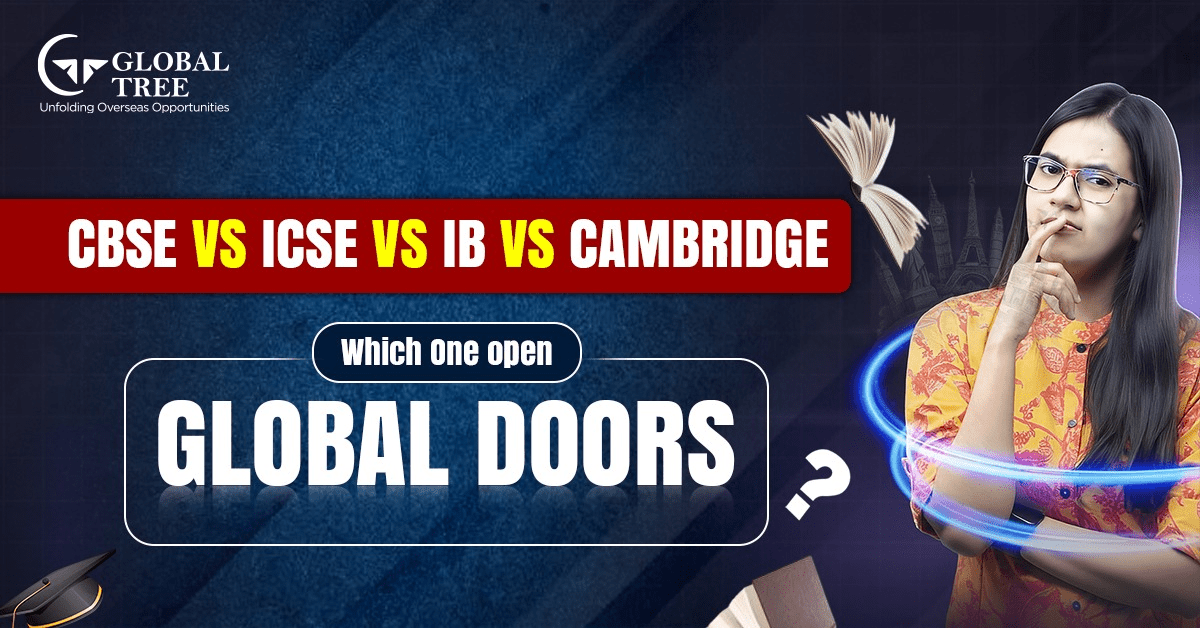IELTS vs TOEFL: Which is Easier to Crack?

- Difference between IELTS & TOEFL
- IELTS Vs TOEFL
- IELTS: In A Brief
- TOEFL: In a Brief
- IELTS vs TOEFL: Indian Perspectives
- IELTS vs. TOEFL: International Perspectives
- IELTS vs. TOEFL: Breakdown
- IELTS vs. TOEFL: Test Dates and Registration
- IELTS vs. TOEFL: Scoring System
- IELTS vs. TOEFL: Preparation tips
- And Finally
- FAQs - Frequently Asked Questions for IELTS vs. TOEFL
Difference between IELTS & TOEFL
Planning to Study Abroad?
Well, buckle up, because when it comes to proving your English proficiency, two heavyweight contenders step into the ring IELTS (International English Language Testing System) and TOEFL (Test of English as a Foreign Language).
These exams are like the Batman and Superman of the language-testing world, each with its own set of superpowers. So, let's dive into the world of IELTS and TOEFL and figure out which superhero suits your language proficiency quest!
IELTS Vs TOEFL
| Aspect | IELTS | TOEFL |
|---|---|---|
|
Test Format |
Academic and General Training |
Online: Reading, Listening, Speaking, Writing |
|
Accepted By |
UK, Australia, Canada, Worldwide |
Primarily U.S., accepted in some other countries |
|
Test Sections |
Listening, Reading, Writing, Speaking |
Reading, Listening, Speaking, Writing |
|
Score Range |
0-9 (Band Score) |
0-120 (Total Score) |
|
Test Dates |
Multiple times a month |
Specific dates, fewer times per month |
|
Registration |
Online, available in major Indian cities |
Online, available in major Indian cities |
|
Preparation |
Practice all skills, take practice tests |
Practice typing essays, online reading, speaking into a microphone |
Quirk Alert: Choosing between IELTS and TOEFL is like picking the perfect travel playlist – it depends on the destination you have in mind!
IELTS: In A Brief
If IELTS were a person, it would be the life of the party. The IELTS exam is all about assessing your ability to communicate effectively in English. Whether you're going to the UK, Australia, or Canada, IELTS is the cool friend who's always up for a chat.
Format: IELTS test comes in two flavours – Academic and General Training. Academic is for those looking to pursue higher education, while General Training is for work and immigration purposes. The test is divided into four sections: Listening, Reading, Writing, and Speaking.
Listening: Imagine eavesdropping on a juicy conversation. That's IELTS Listening for you. You'll hear recordings of native speakers and answer questions based on what you hear.
Reading: This section tests your ability to understand and interpret written English. Think of it as deciphering the secret code of academic texts or everyday situations.
Writing: Time to put pen to paper! IELTS Writing challenges you to express your thoughts clearly. You'll be required to complete tasks like crafting an essay or responding to a letter.
Speaking: This is where you shine – orally! A friendly examiner will engage you in a conversation, discussing various topics to evaluate your spoken English skills.
Quirk Alert: IELTS is like a friendly parrot – it loves your words! So, pepper your responses with rich vocabulary and expressions.
TOEFL: In a Brief
TOEFL, on the other hand, is the tech-savvy genius in the room. If IELTS is the chatterbox, TOEFL is the one who aced the online game and built an app for it. This exam focuses on academic English and is widely accepted in the United States.
Format: TOEFL exam is entirely online and has four sections: Reading, Listening, Speaking, and Writing.
Reading: You'll read passages and answer questions. It's like navigating through the digital library of your dreams.
Listening: TOEFL Listening throws various accents at you – American, British, and even Canadian. It's like a global audio tour where you prove you can understand English in all its flavours.
Speaking: Don't be shy! TOEFL Speaking involves tasks like expressing an opinion, summarizing information, and having a conversation. A computer records your responses, making it a solo performance.
Writing: Time to type away! TOEFL Writing tasks require you to express your ideas in a coherent and organized manner.
Quirk Alert: TOEFL is the Elon Musk of language tests – it loves efficiency. Speak clearly into the microphone, and type with purpose.
IELTS vs TOEFL: Indian Perspectives
Now, let's talk about how IELTS and TOEFL play out in the Indian context. Picture this: you, sitting in a cosy corner of your favourite chai spot, contemplating your international adventure. Which exam should you choose?
IELTS in India: A classic choice. IELTS is widely accepted by universities in the UK, Australia, and Canada. Many Indian students opt for IELTS, as it caters to both academic and general language needs.
TOEFL in India: If you're eyeing the United States, TOEFL. U.S. universities often prefer TOEFL scores, and the test is tailored to meet American English language standards. It's also a popular choice among Indian students aiming for U.S. universities.
Quirk Alert: Think of choosing between IELTS and TOEFL as deciding between Bollywood and Hollywood. It depends on where you want your star to shine!
IELTS vs. TOEFL: International Perspectives
Now, let's jet-set around the globe and see how these exams are perceived by universities and immigration offices worldwide.
IELTS Internationally: IELTS is like the global adapter – it fits into the power outlets of multiple countries. From the land of kangaroos (Australia) to the maple leaf nation (Canada), IELTS scores are widely recognized and accepted. It's the golden ticket for those seeking academic or professional opportunities in English-speaking countries.
TOEFL Internationally: If the U.S. calls your name, TOEFL is the red, white, and blue key. American universities often prefer TOEFL scores for admissions, and it's also accepted in other English-speaking nations. So, if Uncle Sam is your dream destination, TOEFL is the way to go.
(Read More: Can you study in the USA without IELTS and TOEFL score?)
Quirk Alert: Choosing between IELTS and TOEFL internationally is like deciding between a koala cuddle and a bald eagle soar. It depends on the wildlife you fancy!
IELTS vs. TOEFL: Breakdown
So, you're at a crossroads, and you're torn between IELTS and TOEFL. Let's break down the showdown and see which one emerges victorious in different scenarios.
For Academic Pursuits
IELTS: If you're dreaming of sipping tea in London, marvelling at the Sydney Opera House, or studying under the northern lights in Canada, IELTS is your academic sidekick. It's widely accepted in universities across the UK, Australia, and Canada
TOEFL: If your eyes are set on the bustling campuses of American universities, TOEFL is your passport. U.S. colleges often prefer TOEFL scores for admission, making it your golden ticket to the American academic dream.
For Immigration and General Purposes
IELTS: If your journey involves settling down in Australia or embracing the friendly maple leaf vibes in Canada, IELTS is your go-to for immigration and general training purposes.
TOEFL: While TOEFL is primarily an academic superhero, some countries and institutions accept it for immigration purposes. However, IELTS tends to be more commonly recognized in this arena.
Quirk Alert: Choosing between IELTS and TOEFL is like picking the perfect travel playlist – it depends on the destination you have in mind!
IELTS vs. TOEFL: Test Dates and Registration
Planning to face the language test showdown? Here's a quick guide on test dates and registration for both exams.
IELTS: This test is like a Bollywood blockbuster – screenings happen frequently. IELTS is conducted multiple times a month, allowing you to choose a date that fits your schedule. Registration is typically done online, and you can find test centres across major Indian cities.
TOEFL: Think of TOEFL as a Hollywood premiere with specific showtimes. TOEFL is offered fewer times per month compared to IELTS, so plan your schedule accordingly. Registration is online, and test centres are available in major Indian cities.
Quirk Alert: Scheduling your language test is like booking tickets for your favourite movie. Plan, so you get the best seat in the house!
IELTS vs. TOEFL: Scoring System
Now, let's talk scores – the star ratings you'll flaunt on your language proficiency resume.
IELTS: Brace yourself for the band score! IELTS band scores range from 0 to 9, with 9 being the pinnacle of English proficiency. Different universities and institutions may have different score requirements, so check their preferences before you start the journey.
TOEFL: TOEFL scores are more straightforward – you'll receive a total score out of 120. Each section (Reading, Listening, Speaking, and Writing) contributes equally to your overall score. Again, universities may have specific score requirements, so do your homework.
Quirk Alert: Scoring in IELTS and TOEFL is like earning stars in a video game – the higher, the better! Aim for the galaxy, dear language explorer.
(Read More: Why is it important to take IELTS Coaching?)
IELTS vs. TOEFL: Preparation tips
Now, let's get down to the nitty-gritty – how to survive the language test jungle.
IELTS: Picture this as preparing for a Bollywood dance sequence – practice is key. Work on your reading, writing, listening, and speaking skills. Familiarize yourself with the test format, and consider taking practice tests to build your confidence.
TOEFL: It's time to channel your inner tech guru. TOEFL requires a different set of skills. Practice typing essays, get comfortable with online reading, and practice speaking into a microphone. Taking online practice tests will help you navigate the digital landscape.
Quirk Alert: Preparing for IELTS and TOEFL is like training for a dance battle and a gaming tournament simultaneously. Flex those linguistic muscles!
And Finally
In the end, whether you choose IELTS or TOEFL, remember that both exams are like catapults propelling you towards your international dreams. They open doors to educational opportunities, career advancements, and cultural adventures.
IELTS: The Friendly Voyage: Think of IELTS as a friendly ship ready to sail you across the oceans of possibilities. It's your companion for smooth conversations and rich experiences.
TOEFL: The Tech Odyssey: TOEFL, on the other hand, is like a high-tech spaceship exploring the academic galaxies. It equips you with the digital skills needed for success in American universities. Taking TOEFL coaching will aid you in doing better on exam day.
So, whether you're craving curry in the UK, dreaming of tacos in the U.S., or contemplating kangaroo encounters in Australia, choose the language test that aligns with your destination. IELTS and TOEFL are the superheroes you need to conquer the language barrier and embark on your international adventure. Best of luck, fellow globetrotters! May your English proficiency soar higher than the eagles and koalas combined!
FAQs - Frequently Asked Questions for IELTS vs. TOEFL
Do colleges prefer IELTS or TOEFL?
TOEFL is more likely to be accepted, as the majority of universities consider TOEFL to be superior to IELTS. It is only in the United Kingdom and Australia that IELTS is popular and is considered crucial to attending graduate school. American universities are particular and accept only the TOEFL score.
Which is easier to pass IELTS or TOEFL?
If it's academic reading, online interviews, MCQs, and typing on keyboards instead of writing, go for TOEFL. Otherwise, choose IELTS. The answer to IELTS vs TOEFL, which is easier, is, as you must've realized, subjective.
Is IELTS American or British?
IELTS means “International English Language Testing System”. This means that it is not a UK English test, it is an International English Language test. As IELTS is international, it means that you can choose either UK or US spelling.
Can I take both TOEFL and IELTS?
Sometimes students wonder which exam they should take. This is a tough question that depends on a lot of factors. Other students decide to take both exams. Since some schools prefer IELTS while other schools prefer TOEFL, this route can increase a student's chances of getting accepted somewhere.









